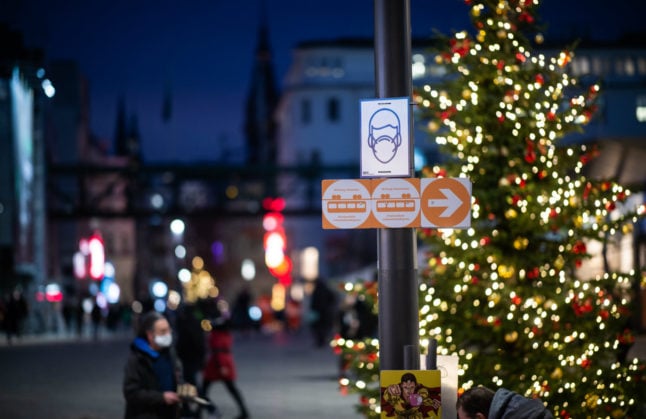Germany appears to be heading for a 'hard lockdown' before Christmas, it has emerged.
Berlin's Mayor Michael Müller, who is also chairman of the Conference of State Premiers, said on Thursday evening it was becoming apparent from talks with his colleagues in other federal states, “that there will be considerable cuts from the 20th” and that retail trade would be “significantly” reduced.
School holidays will have started by then, many people will no longer be at work and public transport will be quieter, so politicians believe it's an ideal time to get infection numbers down.
“Between December 20th and January 10th we will have practically three weeks of massive restrictions, which will also certainly lead to incidences going down,” Müller, of the centre-left Social Democrats (SPD), said to broadcaster ZDF.
Müller, who already spoke out about Berlin enforcing a stricter lockdown, said he expected all state leaders would agree for public life to be reduced as much as possible over Christmas and New Year.
READ ALSO: 'No other way': Berin to enforce stricter lockdown
Why does the situation keep changing?
The initial idea was to start a tougher shutdown after Christmas – around two weeks from now. But as the situation is getting increasingly worse, calls are growing for Germany to take action sooner.
SPD health expert Karl Lauterbach urged leaders to act quickly.
“To start a hard lockdown only after Christmas would be too little and too late. We need this nationwide lockdown, as hard as possible, including school closures, as early as next week.”
German Interior Minister Horst Seehofer also warned against waiting until after Christmas for a lockdown.
“The only chance to regain control of the situation is a lockdown, but it has to be immediate,” he told Spiegel.
In an interview with the Redaktionsnetzwerk Deutschland (RND), the president of the German Medical Association, Klaus Reinhardt, warned: “In view of the currently very high death toll and an unchanged high workload in (medical) clinics, we must reduce contacts quickly and significantly.”
Meanwhile, Economics Minister Peter Altmaier expressed concern about the current development. “The exponential growth is starting again. And that means: we have to act urgently,” The Christian Democrat (CDU) politician said.
Germany managed to get through the first coronavirus wave generally unscathed. But the country is now grappling with rising coronavirus infections and deaths despite enforcing a partial lockdown on November 2nd.
On Friday the Robert Koch Institute (RKI) reported 29,875 new Covid-19 infections within 24 hours – another record in Germany. This is around 6,000 more compared to Thursday, when the previous record of 23,679 was reported.
The RKI on Friday said 598 people had died within a day. The previous daily Covid-19 record was reached on Wednesday when 590 people were reported to have died.
Chancellor Angela Merkel on Wednesday made an unusually emotional appeal in the Bundestag, which brought the seriousness of the crisis into focus.
“I am really sorry from the bottom of my heart… but if the price we pay is 590 deaths a day then then that, in my view, is not acceptable,” Merkel said.
Can Merkel and Germany's 16 states reach an agreement?
State leaders are expected to meet with Merkel for an emergency meeting on Sunday to thrash out a plan,
Throughout the pandemic, federal states and the government have struggled to reach a common line. Merkel had, for instance, advocated for tougher measures earlier in the second wave but could not convince all state premiers to back them.
However, even states with lower infection figures, such as those in the north, are now recognising the nationwide crisis following Merkel's appeal.
Lower Saxony's head of government Stephan Weil (SPD) told broadcaster ZDF: “I assume that between December 19th and January 10th we will have a very, very quiet period in Germany in general. And it has to be like that”
On Thursday, Mecklenburg-Western Pomerania's state premier Manuela Schwesig (SPD) had also spoken out in favour of closing shops – with the exception of supermarkets – as early as the fourth Advent, which falls on December 20th.
READ ALSO: Germany coronavirus situation 'taking turn for the worse', says RKI boss
What happens at Christmas and New Year?
The government and states previously agreed guidelines to loosen contact restrictions between December 23rd and December 31st, allowing up to 10 people from different households to meet, not including children.
Since then, some states have opted for stricter rules. But many are wondering if the rules should be eased at all.
State premier of Rhineland-Palatinate, Malu Dreyer (SPD), told ZDF that Germany had to be tough during the festive period.
“I think we also have to be really strict at Christmas, and definitely also on New Year's Eve,” she said.
Federal Family Minister Franziska Giffey (SPD) recommended that residents in Germany “only meet in the smallest circle and otherwise refrain as far as possible from visiting relatives over the holidays”.
READ ALSO: What you need to know about travel in Germany (and abroad) at Christmas and New Year



 Please whitelist us to continue reading.
Please whitelist us to continue reading.
Member comments